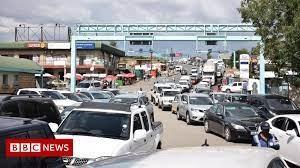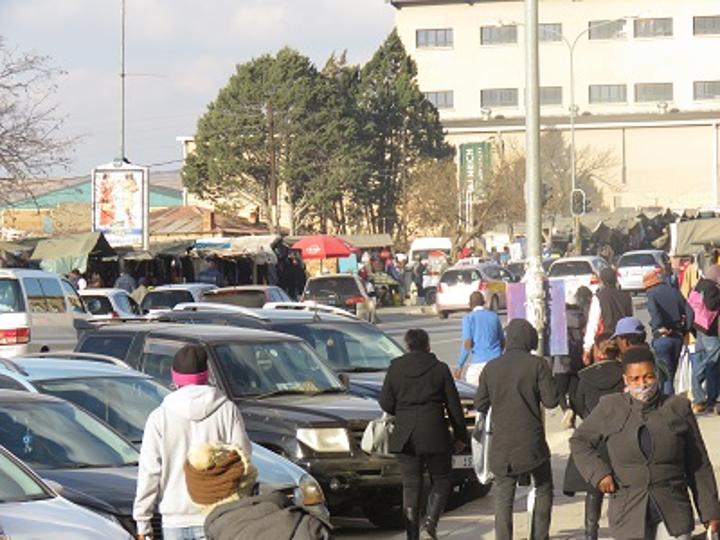Africa-Press – Lesotho. On a Monday morning in Maseru, the only city Lesotho has, and the ever busiest and congested, whistles of the taxi conductors and vendors as they sell their merchandisend hooting taxis along the famous
Kingsway road. However, owing to the Covid-19 movement restrictions which saw the closure of schools, the traffic congestion has since declined. Being the economic hub of Lesotho and the epicenter of most
services which are unavailable in other parts of the country, it is seemingly overwhelmed as its capacity has been stretched beyond limit. Fast growing urban areas and cities appropriate that the land
should be well planned for the smooth service delivery be it water and sewage connections, telephones and electricity networks, construction of roads or
sidewalks. This says that some development infrastructures will not see the light of day in places where the land is not properly managed and controlled by
those with reasonable skills and foresight. The spatial planning protects the biodiversity and guard against environmental damage. Meanwhile land pollution and leaking of underground water
pipes and sometimes sewage, which can be seen spilling all over main roads, remains a lump in the throat for Maseru. According to the Bimkom. org, “spatial planning shapes the
area in which we live. Planning policies regulate our access to housing, schools, health clinics, parks and industrial and employment zones, as well as
our access to water, electricity, sewage and roads. Planning therefore plays central role in determining the quality of our environment and our prospects for
socio-economic development as well as the general well-being of communities and individuals alike. ” It seems something has to give in order to realize the
implementation of the laws on spatial planning. Of the 17 Sustainable Development Goals (SDGs), goal 11 talks of sustainable cities and communities, which face the threat of ever reaching that
status due to poor or no planning. In a wide ranging interview with the Lesotho Town and Regional Planning Institute’s (LTRPI) Public Relations Officer (PRO) Tebobo
Lebusa said, “planning has to serve public interest. ” LTRIP is a legally registered professional body whose objectives include advancing the art and science of urban and regional planning, established in 2015.
“As professionals we are concerned with how the land is been used,” he charged. He went on to urge the government to think of seriously
involving the spatial planning in all its endeavors and engage all relevant stakeholders engaged in land usage. He said street networks have to be planned as urban areas are
centers of economic activities. “Planning controls human activity,” he maintained. He argued that unplanned towns and cities contribute to urban sprawl (commuter belt), that is normally unplanned geographical expansion taking place on a land.
Planning should be
decentralized Lebusa said Lesotho is privileged to have an urban and regional planning discipline offered at the National University of Lesotho (NUL).
He however hastened to point out that one of the challenges which has rocked the country is that of decentralization, where he said the Urban and Regional Planning need to be absorbed in the public service from the councils
so that their expertise can help the country overcome the poor planning challenge it faces. Despite Lesotho having formulated her National Decentralization
Policy in 2014, the physical planning enthusiast said Lesotho lacks behind in implementation. Prior to that, the country has in 2004 gazetted the Lesotho Town and Country
Planning Bill, which is the legal instrument on planning. It could also be evidenced in that this policy is yet to be put in action by the Ministry of
Local Government and Chieftainship, which should empower local councils to work on issues pertaining land usage and administration. He advocated for the formation of Spatial Planning Authority,
which he says should coordinate all related land issues. Also, he warned that if the spatial planning efforts are poorly executed, that could lead to the developmental infrastructure frustrations in the near future.
Lack of Implementation
Though the Ministry of Local Government and Chieftainship has assigned the issues of spatial planning to Land Survey and Physical Planning (LSPP), which is mandated with the planning responsibilities of the land,
Lebusa warned that no one should get without having their plots examined by skilled personnel. LSSP offers security of tenure and is therefore way forward to other
institutions, which are also working on land administration. Lebusa blamed lack of political will since Lesotho got her independence in October 1966. He said his institution had engaged with the
Ministry of Local Government and Chieftainship in different scenes on issues related to planning. Of particular note, he cited zoning as a regulatory tool for
planning. He argued that through properly zoning instruments, poor town planning could be avoided. Zooning is about the segregation of the land be it for residential, commercial and agricultural.
Ideal scenario
He said the problem of land use incompatibility could be avoided by well capacitated institutions and legal frameworks which are dealing with the land.
Lebusa proposed the laws and regulations which when enacted should enforce control and management of the land. He maintains these will also cater for future
of built environment and natural environment. Central to this he said there should be coordination of the institutions whose work affect the use of land.
He further showed that institutional deficiencies, particularly on the service providing companies such as Water and Sewage Authority (WASCO), Lesotho Electricity Company (LEC), Maseru City Council (MCC)
and other service rendering institutions, could be arrested by spatial planning. He further advised of the balance between sustainable environmental practices which should accommodate infrastructure developments on villages and
cities. Lebusa said despite the fact that Members of Parliament (MPs) enact laws, he said they leave the planning element aside. “They [MPs] do not say what happens to the planning.”


For More News And Analysis About Lesotho Follow Africa-Press






